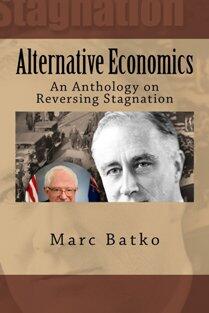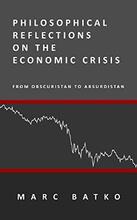Dear Friend Reviewer,
I am a freelance translator living in Portland OR. This 150-page anthology has translated articles by Austrian, Swiss, Polish and German economists who could lead us to a future-friendly economics respectful of human nature and the rights of nature. Mainstream neoliberal economics has no answer to exploding inequality and destruction of nature.
Reviews are essential. Without reviews, books often remain obscure and unknown.
This anthology is now available through Amazon Kindle and CreateSpace. On my website www.freembtranslations.net, I offer 800 translated articles on the economic crisis.
I look forward to your email and your review.
Marc Batko
Portland OR
The anthology "Alternative Economics: Reversing Stagnation" includes 3 translator's introductions, 3 poems from the translator, 12 articles by Tomas Konicz, and articles by Ulrike Herrmann, Helmut Martens, Franz Garnreiter, Sven Giegold, Karl Georg Zinn, Mohssen Massarat, Joachim Bischoff, Andreas Kolbe. Attac and the Rosa Luxemburg foundation. New priorities, assumptions and policies are vital. Less
The financial sector should be shriveled and the public sector expanded. The myths of self-healing markets, efficient financial markets, nature as a free good, external and sink, infinite growth in a finite world, quantitative growth and the exact sciences eclipsing qualitative growth and the human sciences (history, literature, play, language, sociology, political science, philosophy) and private opulence next to public squalor (cf. John Kenneth Galbraith) must call us to rethinking – individually and collectively.
Alternative Austrian, Swiss, Polish and German economists can alert us to the bankruptcy of austerity policy and fiscal policy aiding capital at the expense of workers and the environment. The future economic policy must be regional and decentralized. A post-materialist economy is possible as we transition from excess to access and more to enough. Work, health, strength, security and happiness can be redefined. The rights of nature can be respected in a future of moderation, equality and freedom.
More and more is produced with fewer and fewer workers. Work and income have uncoupled as people cannot survive on their earnings from work and depend on credits and loans. Reducing working hours is a response to increased productivity and is the only way to assure everyone of the right to meaningful work. Reducing working hours, as Michael Schwendinger explains, is a socio-economic investment that protects long-term health interests and gives people more time sovereignty
Here is an thumbnail outline of several alternative economists. Peter Ulrich is a Swiss economist. The economy must be embedded in society. Society must not be embedded in the economy. Ulrich Thielemann is a Swiss and German economist. Profit making is not profit maximizing. Studying economics today is like brainwashing. Tomasz Konicz is a Polish economist. The 30 year crisis is not an Obama crisis. Wages were stagnant for 35 years. Credit was expanded. Families worked 3 or 4 jobs. Health care, education and housing became unaffordable. The US became a black hole for the global economy.
Personal performance always depends on the work of past generations and state interventions. Americans fall to a new feudalism with the deserving and undeserving, fear-mongering and racism. Pragmatism or market religion often replaces vision, principle and courage. Confusing speculation and investment makes the next crisis inevitable. Wall Street banks spent $10 billion in campaign contribution and lobbying ensuring corruption, weak financial deregulation and shifting private losses to public taxpayers.
TABLE OF CONTENTS
Translator's Foreword
Translator's Introduction
Three Poems for the New World
A. ALTERNATIVE ECONOMICS: PLURALISM AND THE PUBLIC INTEREST
1. Ulrike Herrmann: The Crisis of Economists
2. Helmut Martens: Social Inequality Today
3. Attac: Learning Economic Democracy
Introduction
Causes of the Global Financial Crisis
The Neoclassical Crisis Narrative
The Keynesian Crisis Narrative
The Marxist Crisis Narrative
4. For the Renewal of Economics: Memorandum of Shocked Economists
B. ALTERNATIVE ECONOMICS: SHRIVELING THE FINANCIAL SECTOR AND EXPANDING THE PUBLIC SECTOR
1. Tomasz Konacz: From Real Estate Speculation to Collapse of Global Deficit Economy
2. From the Debt Showdown into the Recession
3. The Crisis Explained
4. Democracy in Crisis: The Terror of Economy is a Danger to Democracy
5. The Extremist Society
6. In a Vicious Circle
7. Addicted to Liquidity Injections
8. Tea Party: Extremism of the Middle
9. Financial Market Inflammation
10. Ways Out of Capitalism
11. Everything Must Go!
12. The Great Liquidity Bubble
13. Joachim Bischoff: Finance-driven Capitalism
14. Joachim Bischoff: Alternatives to Stagnation and Depression
15. Karl Georg Zinn: The Catastrophe Has Already Begun
C. ALTERNATIVE ECONOMICS: REJECTING MILITARISM AND NEOLIBERALISM
1. Mohssen Massarat: Less Growth and Less Work
2. Mohssen Massarat: The Military-Industrial Complex is the Greatest Threat for World Peace in our Time
3. Michael Schwendinger: Reduced Working Hours as a Socio-economic Investment
4. Franz Garnreiter: Criticism of Market Theory and Market Ideology
5. Andreas Kolbe: The Coded World
6. Sven Giegold: The Lobby for Tax Evaders
7. Ernst Wolff: Janet Yellen's Storytime

by Marc Batko
About this book
About the author
Marc Batko
I am a freelance translator living in Portland OR. Over 800 translated articles await you at www.freembtranslations.net
As an Amazon Associate, humanmade.net earn from qualifying purchases.

Comments